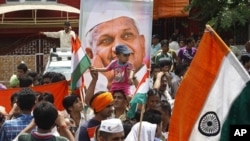In India, tens of thousands of people have rallied behind an anti-corruption campaign led by social activist Anna Hazare, who has started what he says is an indefinite hunger strike to press for a strong law to fight graft.
Early Thursday, the 74-year-old activist accepted an offer from police to leave jail and hold the 15-day public protest at an open-air New Delhi venue capable of holding 25,000 people.
Among those chanting slogans in New Delhi to support Hazare, is an architect who wants to show solidarity with the anti-corruption movement the civil society activist has launched.
Satendra Jain says he has no option but to grease palms of officials at Municipal Corporation of Delhi if he wants approval for plans he makes for clients.
“We have to employ middlemen, they go to the MCD office," explained Jain. "They charge lakhs of rupees [thousands of dollars] for sanctioning the building plans.”
Indians have long accepted paying bribes to get a passport, a driving license or a ration card and have done so without protest for decades.
Anti-graft fight
But they were galvanized into joining the fight against graft by Anna Hazare’s campaign for an independent watchdog committee to investigate corruption. The 74-year-old disciple of Mahatma Gandhi was arrested on Tuesday, sparking street protests in cities across the country.
Hazare’s backers come from a cross section of society: students, housewives, retired civil servants and professionals. Most of them are from the middle class, which is usually politically apathetic, but is now on the frontlines of what Hazare has termed as India’s second battle for independence.
Former bureaucrat Raghunandan Thoniparambil started a website - ipaidabribe.com - last year for people to record experiences of corruption. He says these people are finding an outlet for their frustration.
“There is a lot of pent up anger," he said. "They see Anna Hazare as a symbol behind which they can rally, and they come out and they express their anger.”
Scandals fuel anger
Public anger has been fueled by revelations of a series of multi-billion-dollar scandals involving top officials, which have dominated headlines for almost a year.
But it is petty corruption which people face in day-to-day life that has begun to rankle them.
In New Delhi, independent political analyst Prem Shankar Jha says there is no transaction on which people do not have to pay and a booming economy has worsened the problem.
“What has increased the numbers very rapidly of people who are affected by this kind of corruption and extortion is the rapid growth of the last 20 years, and particularly last ten years," said Jha. "Because more and more people have come into the modern sector of the economy and out of the traditional sector, they have to face the bureaucracy and face the political system and they find they have to pay at every turn.”
Political class at fault
Among those out on the streets there is near unanimous agreement that the political class is to blame for the endemic corruption. Ankit Jaswal is a postgraduate student who has joined the protests.
“Our politicians conduct are going very bad," said Jaswal. "They are totally behaving in interest of themselves, not of country, and they misuse public money.”
But others warn that corruption is not just a “black and white” problem involving bureaucrats and politicians.
Thoniparambil says their analysis of cases reported on their website involving registration of land and homes shows that corruption has become what he calls “a market-chain phenomenon” involving many others besides government officials.
“To our amazement, we discovered it was not merely the government officers who were demanding bribes, but it was a well-oiled private sector network of lawyers, of builders’ agents, who were also part of the game," said Thoniparambil. "They were actually part of the process of persuading people that they just had to pay bribes, and people were just walking into this trap like lambs being taken to the slaughter.”
Can system be revamped?
The system may be deeply entrenched, but is a system that many are now willing to fight in a country where two-thirds of the population is under 35.
They include students like Soumya Jain, who are on the streets and are infused with idealism and confidence that the system can be revamped.
“Change can happen," said Jain. "Change will happen - and that is only if the people of India work towards it.”
However, political analysts warn that the fight against corruption cannot be won by a single-point agenda of creating a powerful ombudsman as Hazare seeks. There are also worries that such a strong ombudsman could undermine existing institutions of democracy. The government says that Hazare’s method of protest - declaring an indefinite fast - is a form of blackmail and he is challenging parliament’s right to frame laws. However, all agree that the fight to clean up governance in India cannot be reversed.




